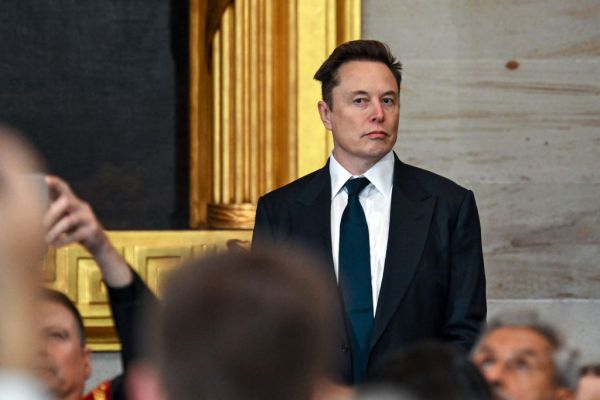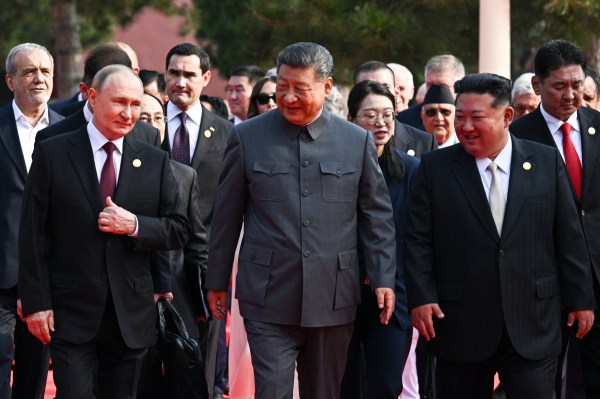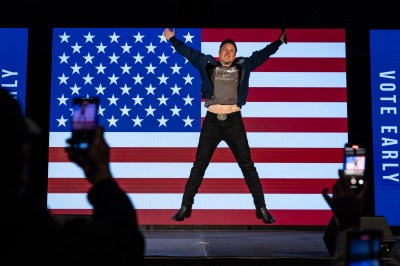Congratulations! Sen. Chuck Schumer and Rep. Hakeem Jeffries have named you their chief strategist ahead of the 2026 midterms. It’s now your job to turn public opinion against the Republicans and deliver big gains for Democrats in the House and Senate next year.
What’s the plan, chief?
“We’ll rally the people against Donald Trump’s outrageous authoritarian assault on separation of powers!” Uh, no, you won’t.
Democrats tried that last year, remember? His opponent devoted an unusual amount of energy to calling him a fascist. His own former advisers backed up her claim. It didn’t matter. Trusting Americans to demonstrate a rudimentary civic conscience at this stage of national decline is the definition of insanity, doing the same thing over and over and expecting a different result.
“We’ll rally the people against the Republicans’ regressive cultural agenda, then!” My friend, you assuredly will not.
Democrats have alienated the public so profoundly on cultural matters that Democrats themselves can’t stop talking about it. “Sometimes, we got folks that are very rigid,” Jaime Harrison, the outgoing Democratic National Committee chair, recently complained. “If you don’t have the right job, if you didn’t come from the right community, if you don’t say the right word, and then therefore you are x-ed out or you’re castigated.”
Sen. John Fetterman was blunter. When asked in an interview why Democrats are now viewed as “toxic” by so many Americans, he replied, “I think their primary currency was shaming and scolding and talking down to people and telling them, ‘Hey, I know better than you,’ or ‘You’re dopes,’ or ‘You’re a bro,’ or ‘You’re ignorant’ or, ‘How can you be this dumb?’ I can’t imagine it. And then, by the way, ‘They’re fascists.’ How can you vote for that?”
Pressed to explain how his party should go about winning back white men, Fetterman said that he’s no longer sure it’s possible.
To grasp what you’d be up against if you chose to fight on cultural terrain in 2026, consider this New York Times poll from January. Voters were instructed to list the issues that are most important to them and the issues that they perceive to be most important to Democrats. Their own top priorities were the economy, health care, immigration and taxes; the Democrats’ priorities, according to respondents, were abortion, LGBT policy, climate change, and the state of democracy. A total mismatch.
That’s a deep hole to try to dig yourself out of—and some progressives continue to insist on making it deeper. On Saturday, delegates elected 24-year-old David Hogg, a gun-control activist known chiefly for being shrill on social media, as the new vice chairman of the DNC. Two days later, Rep. Jasmine Crockett went on national television and described government diversity initiatives as a preoccupation of “mediocre white boys.”
Civic arguments are a nonstarter. Cultural arguments are the heaviest of heavy lifts. Like it or not, for better or worse, if you’re going to put the GOP on defense in 2026, you’re going to have to fight on economics.
Luckily, the president has handed you a juicy target.
A feral Musk.
Economic populism is also a heavier lift for Democrats than it used to be, of course.
As recently as 2012, the left dined out on populism by attacking the Republican presidential ticket for wanting to roll grandma off a cliff, such was the alleged callousness of the GOP in trying to reform Medicare. That’s the thanks former Rep. Paul Ryan and his Tea Party cohort got for taking a looming fiscal crisis seriously. No wonder fiscal conservatism since then has devolved into just another bread-and-circus culture war.
But Democrats can’t take the working class for granted anymore. Trump emerged in 2015 as a political force, blunting the left’s advantage on entitlements by vowing to protect Medicare and Social Security from Ryan-esque bean counters himself. He also shifted the right’s raison d’etre from shrinking government to rolling back progressive cultural gains, a cause that was easier for blue-collar voters to sympathize with. And by presenting himself as a scourge of “the system,” Trump polarized Democrats into becoming defenders of “the system.”
For liberals, that may be the heaviest lift of all. Take one look at this graph and marvel that the party that’s now synonymous with “the system” somehow came close to winning in November. Defending the American “system” from a postliberal cretin is a noble cause, but as an electoral strategy? Liberals are swimming with an anchor tied to their ankles.
As if that weren’t bad enough, Democrats need to contend with the fact that Trump’s first-term economic record was one of his selling points to voters last year. The exit polls on Election Day found 53 percent favored him when asked which candidate they trusted more to handle the economy versus 46 percent for Kamala Harris. The left is in a political hole on that issue too.
Which is where Elon comes in.
The president has lost a few points in job approval since Inauguration Day but he’s still above water, a feat that eluded him for the entirety of his first term. Elon Musk, his “shadow president,” is different: In poll after poll taken since DOGE began chewing up the federal government, he’s viewed negatively on balance and appears to be trending downward.
Morning Consult has his approval rating as “top DOGE” at 41-46, a 10-point net drop in just a few weeks. A progressive PAC that put a similar question to voters in battleground districts got a 43-51 split. And when Quinnipiac asked Americans nationally if they support or oppose a key role for Musk in Trump’s administration, the divide was 39-53.
YouGov found just 13 percent want Musk to have “a lot” of influence in the government, as he plainly does right now, versus 46 percent who want him to have “none at all.” Even Republicans are cooling on him: The same survey saw 26 percent of GOPers hoping that Elon has “a lot” of influence, down from 47 percent in November.
How come? Americans love seeing the rug pulled out from underneath impoverished foreigners who’ve come to rely on U.S. aid programs for survival, don’t they?
Actually, some do. Sniff around Musk’s social media platform and you’ll surely catch a whiff of America-First-ers who believe that culling the Third World herd is overdue. But normie voters, while opposed to foreign aid in principle, might be getting queasy as the consequences of slashing specific programs become clearer. Nothing is more quintessentially American than disliking federal spending in the abstract and then getting cold feet whenever any form of it is threatened.
So maybe Elon is facing a nascent backlash to DOGE’s work. Or maybe the reasons for his slide in popularity are more prosaic.
He’s a fraction as charismatic as Trump is, for instance, and lacks the pretensions to martyrdom that bind the president’s supporters tightly to him. He’s also best known for his work in popularizing electric vehicles, an industry Republicans have traditionally viewed suspiciously. And I’m guessing Trump and his cult, to which Elon is a latecomer, aren’t thrilled with images like this—Musk seated behind the Resolute Desk on the cover of Time magazine—that impugn the leader’s glorious authority. It’s not a coincidence that Musk felt obliged to profess his undying allegiance today after that appeared, I’m sure.
As for Democrats and left-leaning independents, what’s not to hate about Elon? He’s a traitor to their cause after he moved from the center-left to the far-right, and plowed hundreds of millions of dollars into defeating them in November. His DOGE outfit has become the tip of the spear in a postliberal ideological purge of the federal government. He ruined the left’s favorite social media platform too, turning it into a safe space for Groypers and occasionally joining in the fun. There’s a reason he didn’t receive the benefit of the doubt after his did-he-or-didn’t-he Nazi salute.
Oh, right: He’s also the richest man on the planet and is using the apparently free hand he’s been granted over federal agencies to slash support to some of the poorest people on Earth—with his eye on the Social Security Administration next.
If Democrats can’t get economic traction with working-class voters from all of that, they should wind down operations and disband. It’s one thing to lose a battle of populist credibility to Trump, it’s another to lose it to an unelected Joker-ish weirdo whose net worth exceeds the GDP of some European countries gleefully sledgehammering the infrastructure of government, almost certainly in violation of numerous laws, and wrecking charities in the process.
So there’s your Democratic midterm strategy, on a silver platter. Get Elon!
All you need to do now is figure out how.
The debt ceiling gambit.
Here’s where I struggle not to succumb to my native fatalism. I’m not sure there is anything Democrats can do except complain loudly and hope that Musk’s antics ignite a backlash that drives swing voters into their arms next year
“Of course there’s something they can do,” you, the indomitable strategist, say. “There’s a major Senate vote coming in the next few weeks to fund the government and raise the debt ceiling. Republicans will need Democratic help to defeat a filibuster and pass that bill. Democrats should withhold their support until Trump makes concessions on Musk’s work.”
To which I say: You’re placing a lot of faith in Americans if you’re willing to gamble with political stakes as high as that in the expectation that they’ll take your side in the dispute that follows.
Imagine that Schumer heeds your advice and declares that Democrats won’t fund the government unless Elon Musk does … something. It’s not clear what. Resign? Testify at committee hearings about what DOGE’s been up to? Even if he agreed to their demands, would you trust him to keep that promise once Democrats dutifully vote for the Republicans’ funding bill?
And if he were to break his promise, would you expect Americans to care? I refer you again to the lesson of November 5: When voters are forced to choose between gassy civic interests and their own bottom-line interests, like keeping the government running, they look out for number one. It’s preposterous to me to think they’d support something as potentially destructive as a Democratic-driven debt default simply to force a little accountability on DOGE, assuming most even know what DOGE is.
What if Trump calls Democrats’ bluff? “We’re not making any concessions about Elon,” he might say. “Elon’s doing a great job. Americans will be very happy when they see the results of DOGE’s work. Besides, defaulting on our debt would hurt a lot more people than DOGE’s cuts would. If it happens, Democrats will own the catastrophe entirely!”
What does Schumer do at that point? If he caves, he’s lost all credibility. He’d be taken even less seriously as a Trump antagonist afterward than he already is. If he doesn’t cave, he’s committing his party to the uncertain economic and political consequences of a shutdown and debt-ceiling fiasco. How does your 2026 midterm strategy look if Americans come out of this episode believing that Democrats caused the economy to tank?
At a minimum, turning the coming funding negotiations into a standoff over DOGE would mean committing yourself to a PR war with the Trump-Musk propaganda machine—and I don’t like your chances in that fight. Among the many problems Democrats have with blue-collar voters right now is a communication problem: Simply reaching the working class has gotten harder for them as popular media consumption has shifted from major outlets to niche, gonzo infotainment sources that cater to Americans’ existing political prejudices.
You’d have to penetrate numerous ideological filters to overcome that. Meanwhile, Trump would have the bully pulpit and the friendship of information brokers like Mark Zuckerberg. Musk, of course, would have X. Democrats would need to find a way past all of it. The fact that Americans currently take a dim view of Elon based on some mainstream news reporting by no means guarantees that they’ll blame him and the president for an epic fiscal crisis that ensues because of a left-wing freakout about DOGE, especially with the right engaged in a full-on spin blitz.
The one virtue of Democrats using the shutdown showdown to campaign against Musk is that it would, at least, amplify their concerns about DOGE in a way nothing else would. Taking the government hostage and demanding restraints on Elon as their ransom might at least force the issue in front of some working-class Americans who would otherwise never have given a thought to what Musk is doing or why they should care about separation of powers.
But even then, you’re still stuck betting a metric ton of political capital on Americans caring about anything except their own self-interest. Maybe, in principle, they prefer a little more accountability for Elon; maybe, all things being equal, they don’t like cutting off HIV medication to Africa; the question is whether they feel strongly enough about either to believe that it warrants an unprecedented (for Democrats, anyway) form of brinkmanship to stop it.
A DOGE staffer resigned on Thursday after the Wall Street Journal exposed some of his racist social media posts, among them “Normalize Indian hate.” On Friday morning, the vice president of the United States—whose wife is Indian American—hopped onto Musk’s platform to make clear that he thinks the staffer should be rehired. “I obviously disagree with some of Elez’s posts, but I don’t think stupid social media activity should ruin a kid’s life,” J.D. Vance wrote. “We shouldn’t reward journalists who try to destroy people. Ever.”
That’s the sound of a man who’s very confident DOGE’s work won’t be a political liability for the administration in which he serves. My opinion of Americans as a whole has grown sufficiently low that I’m inclined to agree.
None of which is to say that Democrats shouldn’t go on attacking Musk, of course. They should. His polling downturn suggests that the negative coverage about DOGE has made a small dent, and that could turn into a big one if he begins to bump up against Americans’ wallets by targeting domestic spending from which many voters benefit. The blink-and-you-missed-it federal funding freeze last week that the White House quickly rescinded following an outcry was an early warning to Trump that there are a lot of gravy trains out there he had better be very careful not to derail.
In the meantime, while they’re waiting patiently for Musk to cross that line, Democrats should certainly take Jonathan Last’s advice by trying to bring home to Americans the dire implications abroad of slashing outfits like USAID willy-nilly. Introduce voters to some of the Africans who’ll be forced to make do without HIV treatments if PEPFAR is cashiered. Make it hurt.
Make them understand what a colossal fraud it is to cut programs like PEPFAR in the name of “savings” when Trump’s overall fiscal plan looks like this.
Oh, and stop working with him and his administration. It’s one thing for liberals to decline to take the debt ceiling hostage as a form of punishing Trump and Musk, it’s another for them to go on legitimizing Elon’s rampage by participating in ridiculous farces like the House “DOGE caucus.” Democrats seem to be figuring that out, belatedly. They should also start opposing Trump’s Cabinet nominees in the Senate until he brings DOGE to heel. If Republicans want jokes like Robert F. Kennedy Jr. overseeing policy, they should make it happen entirely with their own votes.
In the end, though, how much of a political problem Elon Musk is depends on how much Americans care about a postliberal chud lawlessly hollowing out federal agencies with no accountability to anyone thanks to his presidential patronage and his inexhaustible personal fortune. Wherever you propose setting the line on that question, take the under.







Please note that we at The Dispatch hold ourselves, our work, and our commenters to a higher standard than other places on the internet. We welcome comments that foster genuine debate or discussion—including comments critical of us or our work—but responses that include ad hominem attacks on fellow Dispatch members or are intended to stoke fear and anger may be moderated.
With your membership, you only have the ability to comment on The Morning Dispatch articles. Consider upgrading to join the conversation everywhere.